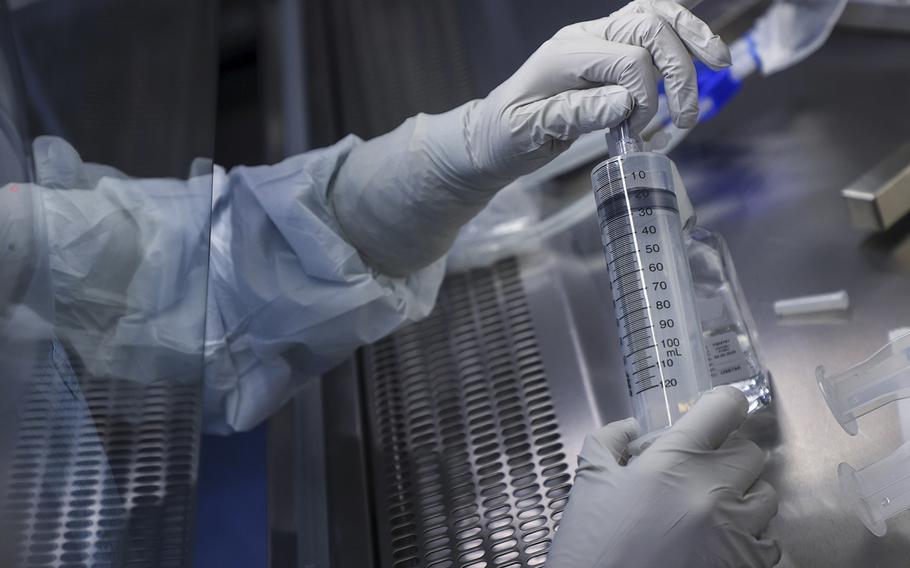Stars and Stripes is making stories on the coronavirus pandemic available free of charge. See more stories here. Sign up for our daily coronavirus newsletter here. Please support our journalism with a subscription.
WASHINGTON — White House coronavirus coordinator Ashish Jha said Tuesday the newly reformulated omicron-targeting boosters mark an "important milestone" in the U.S. pandemic response, moving the country to a point where a single annual coronavirus shot should provide a "high degree of protection against serious illness all year."
The cadence would be similar to that of the annual flu shot, which could be administered at the same time.
"I really believe this is why God gave us two arms — one for the flu shot and the other one for the covid shot," Jha said.
Heading into the third fall of the pandemic, Jha and other Biden administration health officials urged eligible Americans to get an updated booster now. The shots are available for people as young as 12, following approval last week of boosters from Moderna and Pfizer-BioNTech that target the dominant circulating strain of the virus, BA.5.
Staying up to date on coronavirus vaccination can get the country back "to a more normal set of rules," Jha said, allowing businesses and schools to stay open.
Barring curveballs from new variants, "it is reasonable to expect, based on what we know about immunology and science of this virus, that these new vaccines will provide better protection against infection, better protection against transmission and ongoing and better protection against serious illness," he said at Tuesday's news briefing.
Jha said this latest round of shots will offer protection during the busy cold and flu season and that the government hopes to transition people to getting the vaccine yearly. Typically, at least half of U.S. adults get a flu shot.
Moving to yearly coronavirus shots would be a shift from the current practice, where high-risk Americans have been urged to get boosters every few months, but uptake has been disappointing. (The elderly and those with weakened immune systems may need more frequent doses.)
All Americans must do their part to get the shot, if not for themselves, then for "your grandmother, or your vulnerable uncle or for your friend," Jha said.
Rochelle Walensky, director of the Centers for Disease Control and Prevention, cited modeling projections that were presented last week to the agency's vaccine advisory committee showing that if the public embraces the boosters early this fall at a rate similar to that of annual flu shots, about 100,000 hospitalizations and 9,000 deaths could be prevented.
Some experts have said that may be an optimistic assumption given that more than half of Americans eligible for boosters have yet to receive their first dose. Given waning immunity of the coronavirus vaccines, it's also not clear whether an annual COVID shot will provide protection that lasts a year.
The federal government has purchased more than 170 million doses of the updated boosters, and doses began shipping last week, following authorization by the Food and Drug Administration. Like other coronavirus shots, the boosters will be free. Pharmacies and other retail locations are booking appointments, and health officials urge people to check availability on vaccines.gov. Officials said appointments will be widely available within the next week.
Health officials have said people who have had a recent infection or were recently vaccinated should wait at least two months before getting the updated booster.
Health and Human Services Secretary Xavier Becerra said the administration plans to work with community-based organizations, including parent-teacher organizations, pastors and groups focused on racial equity to host pop-up clinics this month in hopes of reaching diverse groups of Americans, including Black and Latino communities.
Anthony S. Fauci, chief medical adviser to President Biden, said if BA.5 stays dominant, or even if it exhibits minor changes, the updated booster will "very likely hold a substantial degree of protection."
But officials warned on Tuesday that dwindling funds threaten the government's ability to respond as effectively if a new variant emerges. The Biden administration last week asked Congress to approve more emergency funds, including $22.4 billion for the coronavirus response, much of which would facilitate the development and purchase of next-generation vaccines and treatments. The money also would help restart programs that recently ran out of funds, including an initiative to provide free tests that the White House said it had to wind down Friday after months of congressional inaction.
If Congress waits until another variant arises to approve additional funds, it will likely cost taxpayers "twice as much and will be less effective," Jha said.
"Congress is aware that if we do not continue to fund the response things, we can easily go backwards."

An employee prepares a syringe of raw materials for messenger RNA, the first step of COVID-19 vaccine production, at the BioNTech laboratory in Marburg, Germany, on March 27, 2021. (Cyril Marcilhacy/Bloomberg)